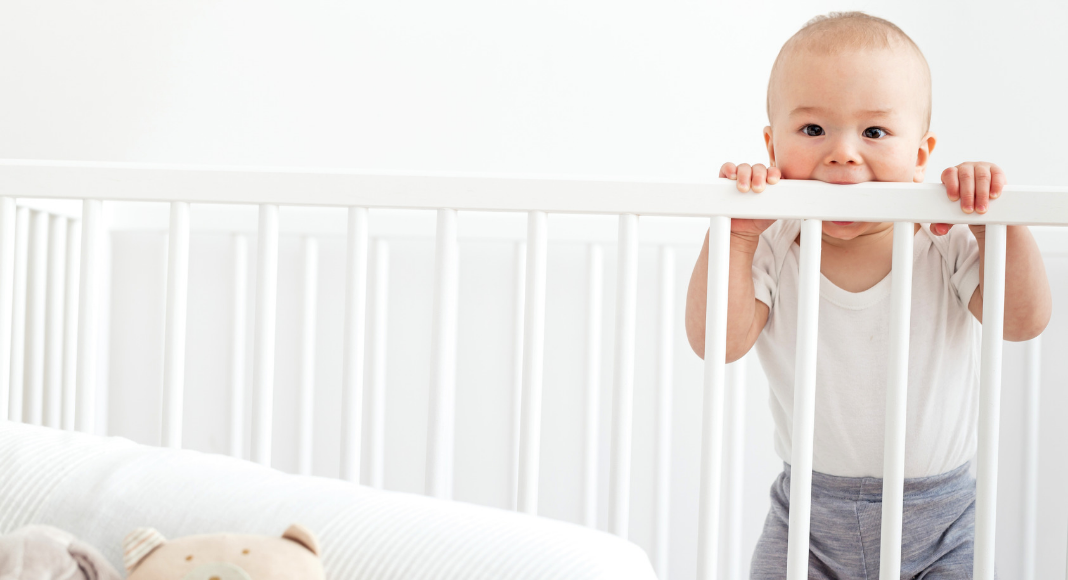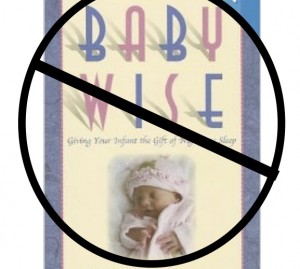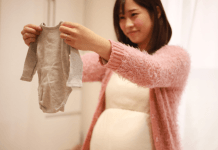 I don’t have many regrets in life. But, I sincerely wish I could rewind time and have a do-over with my firstborn. Why? In a word (although technically it should be two): Babywise.
I don’t have many regrets in life. But, I sincerely wish I could rewind time and have a do-over with my firstborn. Why? In a word (although technically it should be two): Babywise.
In fact, I’d be so bold as to say that Babywise (a method of sleep training found in a book by same name by author Gary Ezzo) made my first six months of motherhood miserable and may have contributed to some of the insecurities I see surfacing as the child I subjected to this method ages.
My perspective on this subject is somewhat unique in that I had four babies within a window of five years. Though I have friends that claim both “victories” and “failures” using the system, I feel my condensed childbearing timeline gave me a special opportunity to test Babywise’s methods against others (mainly trusting my instincts).
My story is a common one. A friend recommended the book because it worked for them. I was entering unchartered territory and desperate. So, I’d read anything I could get my hands on.
To a brand new mom, sleeping through the night is that big elusive milestone. It seems the sooner your children reach it the bigger the “motherhood merit badge” you earn. The concept of following a method to meet that goal sounded delightful.
That’s what Babywise offered. So, I bit.
There was a certain degree of logic to it. The book knew exactly how to appeal to me. It lured in the part of me that desperately longed to have a child without changing my comfortable “childless” life at all.
It also convinced me (temporarily) that the problems in the world today are created by how “baby-centric” parents become. Since I didn’t want to raise a selfish child, it only made sense to demand this creation of mine to fall in line.
The problem was Babywise didn’t work at all like it should have. Instead of realizing that maybe the system (or the author and his theories) were at fault, I blamed myself. Already struggling with some degree of post partum depression, I faced a rough reality check. Parenting was going to be a lot harder than I ever dreamed.
My first few months with Babywise resulted in a stressed out, frazzled, demoralized, depressed new mom whose perceived failure at having the Babywise method work was just another strike against her.
I had acquaintances that swore by it…touting the only way they could do it (turn off their instincts to follow Babywise that is) was to go outside and talk on the phone or get in the shower and turn on music. This would drown out the cries. They encouraged me to do the same…it would be “hard” on me but “good” for the baby.

Now, I think about this advice as preposterous. If my four-year-old needed me because he was hurting or scared and I went outside so I couldn’t hear him crying…that would be cruel, right? Or, better yet, if I was sad, lonely, hungry, or just feeling insecure and I was crying in bed and my husband got in the shower to tune me out, that would sound like abuse, wouldn’t it?
The challenge for most new mothers (myself included) is that I didn’t know whether or not I could, or should, trust those instincts. I was paralyzed with fear that I would do it wrong. Simultaneously I was concerned that I didn’t even know what “wrong” was in this arena. I was more tired than I had ever been in my entire life. So, I bounced between reading the book desperately to figure out what page I must have missed or what I must have been messing up to get it to work correctly and cursing the book for making me so miserable.
After encouragement from my mother (who read the book and thought it was insane) to experiment with things like feeding to sleep, napping in the swing, and co-sleeping, things started to go a little better. Oh, and my almost three month old son–who had gotten so frustrated he had taken to head banging–stopped that behavior as soon as I gave up the Babywise method and started answering his cries.
It was very hard to quit though. I felt tremendously guilty for not following the book and was concerned that like the book promised, once I put the baby in our bed he’d be in there until he was at least 12. But, I was at the point of desperation. I needed some sleep. He needed some sleep. And, (shockingly) her suggestions were working better than Mr. Ezzo’s.
I also recognized that my son had some digestive issues. (Four children later I’m able to diagnose exactly what they were better than any of my firstborn’s pediatricians ever could.) In addition to his problem with acidic foods and dairy, because of the Babywise feeding rules, I was way over feeding the little guy. Truth is, it’s impossible to know this stuff as a new mom. I was so concerned about him gaining weight and going to bed full that the thought of him eating too much and that causing digestive issues never crossed my mind.
Baby two came just 16 months after baby number one. This time I followed my gut. She slept in the swing frequently. If she fell asleep while eating I’d put her down. She slept through the night at five months old and, although we co-slept when needed those first few months, never slept in our bed after six months of age.
Is Babywise completely ineffective for everyone? No. I do have friends that will still swear that it worked for them. (I know some of you reading this are thinking you had no troubles with it.)
But, mommy friends, looking back I think this method is scary dangerous. And, although it may be getting some children to sleep through the night faster, the long term consequences are real and far more important than that first “sleeping through the night” milestone. You can’t think about what your child will be like at six or seven when all you want is to make it through the first year. But, let me encourage you that your parenting isn’t finished when they start sleeping. It’s only just begun…
Some recent studies have come out about the consequences of having infants cry it out and what happens when our newborns don’t attach well. Beyond that, this study explains how you aren’t really training an infant to sleep when you don’t respond to cries. Instead, the baby’s neurological system shuts down from frustration and sleep follows.
These reports cite correlations with more stressed out and anxious children later. I can attest to this. I see differences between my Babywise baby and my other children. My oldest displays more fear, has a more difficult time with expressing emotion, and is very guarded.
Of course, I understand that each child has a unique personality and that maybe that’s his natural bent. But, as I read the reports like this one on the impact of systems like this, I can’t help but see some similarities in my now-seven year old.
Being a mom is the hardest job I’ve ever had. And, like most new moms, I was desperate for some guidance on how to do it “right.” But, I think we moms, at all stages, have to free ourselves of that pressure. There isn’t a right way or a wrong way. There is your way and there is my way.
Every child we have added to our family has done some degree of messing up the rhythms for the rest of the family. Everyone has had to adjust as each new baby has come along. The Babywise method of make the baby fit you just doesn’t make any sense to me, at any level, anymore. Scheduling has some merit…routine has lots of merit… But, Babywise as a comprehensive system to be followed to the tee, is a bad idea.
Now, on the other side of newborns, I certainly wish I had researched more about the author, his background and lack of credentials before I put my child through his system. I’m embarrassed that I trusted this unknown man to tell me how to raise my newborn.
I hope you’ll do the same and avoid my regrets.
To read a counter opinion, check out Why I Stuck With Babywise.














Our babe is a very happy one year old who sleeps very well. To blame how your child turned out on a single method I think is a bit extreme. There are a lot of factors that go into parenting and everything with a grain of salt. I think there is a balance of following your parenting intuition but also weighing the thought that maybe they just woke themselves up and will go back to sleep in 3 minutes without you rushing in. Just some thoughts- I do enjoy reading the different opinions and am curious how some people utilized this method. Nobody is perfect at what they preach parenting wise but this has definitely worked for us especially being a depressed, exhausted mom who could finally sleep because he was sleeping better- not always crying it out, but just went to sleep easier without all the rocking etc. Blessings to yall and no guilt or regrets.
Jordan Allen you do not have a clue what you are talking about. The Ezzo program has caused many thousands of kids to have lifelong attachment disorder with unbelievable complications. Do some research next time before making yourself look uneducated and foolish.
The Ezzo “cry it out” method creates lifelong panic and anxiety in those who it was used on. The Ezzo parenting program is pure evil and has caused severe lifelong attachment disorder. I could not begin to tell you how it has wrecked our lives. Those who defend it are simply uneducated and inexperienced with attachment disorders.
I am watching my friends daughter raise both children on Baby Wise. The 4 year old has an eating disorder. The youngest one did for a time but I haven’t checked as I hate hearing about the issues. I believe it’s caused by the technique used in the book.
Babywise is simply following an eat / wake / sleep cycle. It doesn’t involve ‘crying it out’, so those who associate the two have not read the book. Some Babywise parents ALSO use the ‘Ferber’ cry it out method (unrelated to Babywise). I did Babywise with all three of my kids and never once let any of them ‘cry it out.’ I think there is a lot of confusion here amongst people who haven’t read the book yet are giving advice as though they have (which is scary). Babywise worked so well for me and for my friends, who introduced me to Babywise. Best decision I ever made was to follow an eat / wake / sleep cycle for my kids and follow appropriate awake times for their ages.
The Ezzo’s Preparation for Parenting books and videos advocate a 20-minute cry-it-out rule which is at the heart of the program. Ezzo stated very clearly that you would spoil your baby if you ran to it every time it cried, and he established a firm 20-minute rule to allow babies to cry up to 20 minutes before being comforted. This is outright inhumane abuse and it has ruined the lives of many kids who ended up with panic disorders, anxiety disorders, and attachment disorders. If you think otherwise you are simply uneducated. Talk to the tens of thousands of Ezzo parents who have had their lives destroyed.
The American Academy of Pediatrics (AAP) warned against the book, stating that its advice could result in infant development problems such as dehydration, poor weight gain, slow growth, delayed development and failure to thrive. In 1998, Bill Sears, evangelical author, pediatrician, and clinical assistant professor of pediatrics at the Keck School of Medicine of USC, best known as the foremost proponent of attachment parenting said of the book, “The Ezzo parenting programs are probably the most dangerous program of teaching about babies and children that I have seen in my 25 years of being a pediatrician.”
If you want to ruin your life and the life of your child, follow the Ezzo parenting programs. Anybody who defends these evil programs is ignorantly defending very cruel, unnatural, and inhumane parenting methods.
From Wikipedia:
On Becoming Baby Wise: Giving Your Infant the Gift of Nighttime Sleep is a Christianity-based infant management book written by Gary Ezzo and pediatrician Robert Bucknam in 1993. Baby Wise presents an infant care program which the authors say will cause babies to sleep through the night beginning between seven and nine weeks of age. It emphasizes parental control of the infant’s sleep, play and feeding schedule rather than allowing the baby to decide when to eat, play and sleep.
The Baby Wise program outlined in the book came under criticism from pediatricians and parents who were concerned that an infant reared using the book’s advice will be at higher risk of failure to thrive, malnutrition, and emotional disorders. The American Academy of Pediatrics (AAP) warned against the book, stating that its advice could result in infant development problems such as dehydration, poor weight gain, slow growth, delayed development and failure to thrive, as well as lack of milk supply in the new mother and involuntary weaning of the infant. The Babywise series of books was observed to be in direct contradiction to the AAP’s own policy statement, “Breastfeeding and the Use of Human Milk,” which recommends 8–12 nursing sessions every 24 hours for newborns, feeding until the baby is sated.
In the late 1960s, Gary Ezzo studied at Mohawk Valley Community College in New York state, but did not earn a degree. In 1983, he enrolled at Talbot School of Theology in a program giving a Master of Arts degree in Christian ministry to people who did not hold a lower degree, but had already been active in ministry for two years. In 1984, Ezzo and his wife Anne Marie Ezzo began teaching parenting classes at Grace Community Church in Sun Valley, California; a 10,000-member evangelical megachurch. Anne Marie Ezzo was raising two children at the time and had for a short while trained as a nurse in a hospital pediatric unit.
In 1984, Anne Marie Ezzo wrote a four-page paper “Parent Controlled Feeding”. In 1985,Gary Ezzo received his Master of Arts degree emphasizing Christian Education from Talbot;. Subsequently, the Ezzos continued to investigate early parenting and with five other couples formed Growing Families International (GFI), organizing as a non-profit in 1987 and becoming a for-profit in 1989. Based on the earlier paper the Ezzos wrote a Christian parenting guide for GFI: Preparation for Parenting: Bringing God’s Order to Your Baby’s Day and Restful Sleep to Your Baby’s Night. The book was published in 1990. Grace Community Church was initially supportive of the Ezzos and their parenting ministry, but in 1997 after four years of discussion, the church reversed its position, criticizing them for creating a divisive atmosphere between parents following the book’s practices and those who favored demand feeding for infants, sleeping with their infants, and sling-type carriers for babies. The church elders banned the books for “stifling the mother’s desire to comfort her children”, for ascribing Biblical qualities to the concept of scheduled feeding, and for failing to address the church’s concerns regarding theological issues . The Ezzos left the church along with a few sympathetic families.
The infant-rearing investigation the Ezzos conducted was performed by GFI and not published or subject to peer review. In training the infant to follow the recommended eating and sleeping schedule, their method expected that at certain times the infant would be left alone to cry when hungry or wakeful. The book justified the act of leaving a baby to cry alone by comparing that choice to the crucifixion of Jesus: “Praise God that the Father did not intervene when His Son cried out on the cross.” The Ezzos wrote that leaving the infant “crying for 15, 20, even 30 minutes is not going to hurt your baby physically or emotionally.” To counter the book’s conclusions, Laura Bassi Zaff, PhD, an expert in childhood cognitive development, wrote that careful research has shown that leaving a baby crying may result in emotional harm, perhaps manifesting as “attachment disorder, or anxiety disorder, or crippling problems with self esteem and interpersonal relationships”.
Later editions of the book separated “Babywise” into two words.
To create a secular version of the book, Gary Ezzo partnered with Robert Bucknam, a pediatrician from Louisville, Colorado, to write On Becoming Babywise: More Than a Survival Guide which appeared in 1993. A pediatrician for less than a year, Bucknam first heard of the Ezzos while taking a class for new parents. He has been described in Babywise materials as a faculty member of the University of Colorado School of Medicine, but Christianity Today wrote that “three sources” at the medical school confirmed Bucknam had never been hired as faculty.
Ezzo and Bucknam wrote a new edition published in 1995: On Becoming Baby Wise: Learn How Over 100,000 Babies Were Trained to Sleep Through the Night the Natural Way—this edition used the single word “Babywise”, later split into two words: “Baby Wise”. Further editions of the book were published in 1998, 2001 and 2007. Changes in the later editions include removing the assertion that the risk of sudden infant death syndrome (SIDS) is not heightened by placing the baby to sleep on its belly, and removing the notion that feeding the baby whenever it appears hungry will give the mother “an abnormal hormonal condition” which could lead to postpartum depression.
Summary
Baby Wise describes an infant management plan built around feed/play/sleep cycles. The authors term their approach to feeding “parent-directed feeding”, or PDF: “Our conviction is that a baby should be fed when he or she signals readiness. With PDF, a mother feeds her baby when the baby is hungry, but she takes advantage of the first few weeks of life to guide the baby’s hunger patterns by a basic routine. This is cooperative parenting.”
The book includes instructions for the care of babies from birth through six months. It primarily covers infant sleep and feeding practices, and emphasizes parental control of infant training. The infant is presented not as the defining center of the household but as a “welcome addition”, subject to larger household order. The material presented in Baby Wise is a re-articulation of various practical methods which are reminiscent of parenting styles advocated by other Evangelical child-rearing advisers.
Ezzo and Bucknam describe their stance as a middle ground between feeding the baby on demand (when the baby indicates hunger) and feeding based on a strict clock schedule. In contrast to advice given by popular pediatrician William “Dr. Bill” Sears, the Baby Wise authors do not condone co-sleeping; Ezzo wrote, “The most serious sleep problems we’ve encountered are associated with parents who sleep with their babies.”
The sleep advice given by Baby Wise is similar to Richard Ferber’s advice given in his popular book Solve Your Child’s Sleep Problems. The Ferber method of getting a baby to sleep similarly includes putting the baby to bed when awake The baby is expected to learn how to fall asleep alone. Both methods warn the parents against using aids such as a pacifier to ease the baby into sleep, and both methods describe putting the infant to sleep without rocking, cuddling or nursing applied for the sole purpose of putting child to sleep. “Crying it out” is expected from the infant during the early training periods, until about eight weeks of age.
A foundation of the book is that “great marriages produce great parents.” Ezzo and Bucknam recommend that the new parents continue to schedule dates with each other and have friends over. The book was intended for mothers wearied by the demands of attachment parenting, in search of more freedom and time for themselves including the pursuit of careers and other interests. The book promises that following its plan “will not leave mom ragged at the end of the day nor in bondage to her child. Nor will Dad be excluded from his duties.”
Reception
Baby Wise has been criticized by mainstream health care professionals for giving dangerously wrong information about infant growth, feeding, sleep and development. Critics include, for example, T. Berry Brazelton, developer of the Neonatal Behavioral Assessment Scale; and Arnold Tanis, of the Florida Chapter of the American Academy of Pediatrics. The Baby Wise program has been associated with infantile failure to thrive, dehydration, malnutrition, problems with milk supply in breastfeeding mothers, and involuntary early weaning.
In 1998, Bill Sears, evangelical author, pediatrician, and clinical assistant professor of pediatrics at the Keck School of Medicine of USC, best known as the foremost proponent of attachment parenting, said of the book, “People began calling me about the stuff in this book several years ago, but I basically ignored it, thinking that it was so far out that it would just die out.” Sears regretted not speaking out earlier, and said about the book that it was “probably the most dangerous program of teaching about babies and children that I have seen in my 25 years of being a pediatrician.”
Ferber method founder Richard Ferber, Director of the Center for Pediatric Sleep Disorders at Children’s Hospital Boston, concurs with Baby Wise regarding some of its sleep advice, but he warns against expecting too much. Baby Wise predicts that the 8-week-old child will be sleeping 7 to 8 hours in a row at night, and the 13-week-old child increasing the nighttime sleep period to as much as 11 hours. Ferber said, “Parents shouldn’t expect babies to sleep that long that early, although a very few will on their own” and says that the book may frustrate parents of babies that are not sleeping so much; the parents may wonder what is wrong with the infant. Ferber says that if a baby sleeps through the night, the parents may actually need to wake it for feeding.
James Dobson, founder of the Focus on the Family ministry, commented on the controversial book, saying “I’ve never attacked it, but I don’t endorse it… I’m not out campaigning against the Ezzos; I’m just not their greatest fan.”
In response to the controversy Multnomah Books stopped publishing the text in September 2001. They returned the book rights to GFI. Subsequent printings have been produced by Parent-Wise Solutions, an imprint formed by the Ezzos to publish their books.
From Wikipedia:
On Becoming Baby Wise: Giving Your Infant the Gift of Nighttime Sleep is a Christianity-based infant management book written by Gary Ezzo and pediatrician Robert Bucknam in 1993. Baby Wise presents an infant care program which the authors say will cause babies to sleep through the night beginning between seven and nine weeks of age. It emphasizes parental control of the infant’s sleep, play and feeding schedule rather than allowing the baby to decide when to eat, play and sleep.
The Baby Wise program outlined in the book came under criticism from pediatricians and parents who were concerned that an infant reared using the book’s advice will be at higher risk of failure to thrive, malnutrition, and emotional disorders. The American Academy of Pediatrics (AAP) warned against the book, stating that its advice could result in infant development problems such as dehydration, poor weight gain, slow growth, delayed development and failure to thrive, as well as lack of milk supply in the new mother and involuntary weaning of the infant. The Babywise series of books was observed to be in direct contradiction to the AAP’s own policy statement, “Breastfeeding and the Use of Human Milk,” which recommends 8–12 nursing sessions every 24 hours for newborns, feeding until the baby is sated.
In the late 1960s, Gary Ezzo studied at Mohawk Valley Community College in New York state, but did not earn a degree. In 1983, he enrolled at Talbot School of Theology in a program giving a Master of Arts degree in Christian ministry to people who did not hold a lower degree, but had already been active in ministry for two years. In 1984, Ezzo and his wife Anne Marie Ezzo began teaching parenting classes at Grace Community Church in Sun Valley, California; a 10,000-member evangelical megachurch. Anne Marie Ezzo was raising two children at the time and had for a short while trained as a nurse in a hospital pediatric unit.
In 1984, Anne Marie Ezzo wrote a four-page paper “Parent Controlled Feeding”. In 1985,Gary Ezzo received his Master of Arts degree emphasizing Christian Education from Talbot;. Subsequently, the Ezzos continued to investigate early parenting and with five other couples formed Growing Families International (GFI), organizing as a non-profit in 1987 and becoming a for-profit in 1989. Based on the earlier paper the Ezzos wrote a Christian parenting guide for GFI: Preparation for Parenting: Bringing God’s Order to Your Baby’s Day and Restful Sleep to Your Baby’s Night. The book was published in 1990. Grace Community Church was initially supportive of the Ezzos and their parenting ministry, but in 1997 after four years of discussion, the church reversed its position, criticizing them for creating a divisive atmosphere between parents following the book’s practices and those who favored demand feeding for infants, sleeping with their infants, and sling-type carriers for babies. The church elders banned the books for “stifling the mother’s desire to comfort her children”, for ascribing Biblical qualities to the concept of scheduled feeding, and for failing to address the church’s concerns regarding theological issues . The Ezzos left the church along with a few sympathetic families.
The infant-rearing investigation the Ezzos conducted was performed by GFI and not published or subject to peer review. In training the infant to follow the recommended eating and sleeping schedule, their method expected that at certain times the infant would be left alone to cry when hungry or wakeful. The book justified the act of leaving a baby to cry alone by comparing that choice to the crucifixion of Jesus: “Praise God that the Father did not intervene when His Son cried out on the cross.” The Ezzos wrote that leaving the infant “crying for 15, 20, even 30 minutes is not going to hurt your baby physically or emotionally.” To counter the book’s conclusions, Laura Bassi Zaff, PhD, an expert in childhood cognitive development, wrote that careful research has shown that leaving a baby crying may result in emotional harm, perhaps manifesting as “attachment disorder, or anxiety disorder, or crippling problems with self esteem and interpersonal relationships”.
Later editions of the book separated “Babywise” into two words.
To create a secular version of the book, Gary Ezzo partnered with Robert Bucknam, a pediatrician from Louisville, Colorado, to write On Becoming Babywise: More Than a Survival Guide which appeared in 1993. A pediatrician for less than a year, Bucknam first heard of the Ezzos while taking a class for new parents. He has been described in Babywise materials as a faculty member of the University of Colorado School of Medicine, but Christianity Today wrote that “three sources” at the medical school confirmed Bucknam had never been hired as faculty.
Ezzo and Bucknam wrote a new edition published in 1995: On Becoming Baby Wise: Learn How Over 100,000 Babies Were Trained to Sleep Through the Night the Natural Way—this edition used the single word “Babywise”, later split into two words: “Baby Wise”. Further editions of the book were published in 1998, 2001 and 2007. Changes in the later editions include removing the assertion that the risk of sudden infant death syndrome (SIDS) is not heightened by placing the baby to sleep on its belly, and removing the notion that feeding the baby whenever it appears hungry will give the mother “an abnormal hormonal condition” which could lead to postpartum depression.
(Continued…)
You can read about the Ezzo’s evil destructive parenting programs on Wikipedia:
https://en.wikipedia.org/wiki/On_Becoming_Baby_Wise
I have read Babywise and even the second Babywise book. In my opinion, (which is really what we are all sharing here-our own OPINIONS) neither the authors nor the book is evil or horrifying. It is ONE perspective on parenting. I liked having help getting some order during the post-partum chaos and daze. I, my husband, and our baby needed sleep, but my husband and I had no idea how much our baby needed. We rocked her to sleep, we walked her to sleep. We sang, bounced, held, fed, swayed, etc…trying to calm her to sleep. We had no idea we were overstimulating her and that we weren’t actually meeting one of her greatest needs: good, restorative, regenerative sleep that she could learn how to do on her own. Once we started training using BOTH our instincts AND Babywise, our baby became much happier, well rested, and alert. It changed everything for better. If our baby cried, we checked on her to make sure she was okay (which is encouraged in the book-they don’t encourage you to ignore your child’s cries completely.) If she was okay, we would give her a reassuring, soothing word, pat on the back, and leave the room. We would let her cry for a couple of minutes, then check on her again, repeat…it took our baby 10 minutes of fussing (never screaming in pain. We used our instincts AND the guidance of the book, remember) to settle down and fall asleep. Then in a few days she did it in 5, then 2 etc. And she woke up happy and smiling because she was well-rested. Anyway, I write all this to say, if you use Babywise you are not a bad parent and you are not evil because you use it. There is a lot of strong language in the comments and in the post itself. If you are loving your baby, you are doing right. I would not have taken the time to write that if I didn’t think it was worth encouraging someone who might feel guilty or shamed because they followed this method. If you took the time to read a book to help your child have the gift of sleep, you probably love your child and that’s huge. (By the way, theAAP also warns against co-sleeping or letting babies sleep in anything other than a flat surface like a rocker, but that is mentioned in the post and comments as okay. So, it seems a little odd to me to harp on how the AAP doesn’t recommend this book …)
One more comment: I also read Moms on Call and The Baby Whisperer and took many elements from all of them. The Moms on Call was probably my favorite because it gave sample schedules tailored to the needs of each age group about how long the feed/wake/sleep cycle should be depending on the child’s needs.